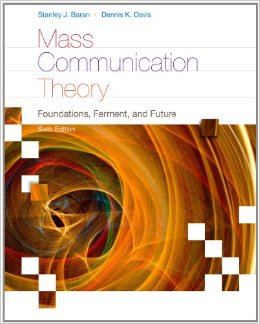Mass Communication Theory Foundations, Ferment, and Future Review of Chaper 2: FOUR ERAS OF MEDIA THEORY We have identified four distinct eras in the development of mass communication theories, beginning with the origin of media theory in the nineteenth century and ending with the emergence of an array of contemporary perspectives. THE ERA OF MASS SOCIETY AND MASS CULTURE The era of mass society theory is characterized by overinflated fears of media’s influence on “average” people and overly optimistic views of their ability to bring about social good. Powerful social and cultural elites, who saw the traditional social order that was serving them so well undermined by popular media content, were the primary advocates of the former view. Urban elites—the new capitalists whose power was increasingly based on industrialization and urbanization—viewed technology, including the mass media, as facilitating control over the physical environment, expanding human productivity, and generating new forms […]
Theory & Different Basic Mass Communication Theories
Mass Communication Theory Foundations, Ferment, and Future Review of Chaper 1: DEFINING AND REDEFINING MASS COMMUNICATION When an organization (Source) employs a technology as a medium to communicate with a large audience, mass communication is said to have occurred. SCIENCE AND HUMAN BEHAVIOR Implementation of the scientific method is difficult for those studying the social world for four reasons: Most of the significant and interesting forms of human behavior are quite difficult to measure. How do we measure something like civic duty? Should we count the incidence of voting? Maybe a person’s decision not to vote is her personal expression of that duty. Try something a little easier, like measuring aggression in a television violence study. Can aggression be measured by counting how many times a child hits a rubber doll? Is gossiping about a neighbor an aggressive act? How do we measure an attitude (a predisposition to do something […]
The Panoply of Political Communication
Chapter 1 • The Panoply of Political Communication Classical Direct Democracy Athenian democracy was distinctive, unique in its time. It also has articulated key principles that have guided subsequent democratic theories and underpin contemporary democratic governments. The philosopher Aristotle endorsed this view, arguing that human beings were political animals. But he did not mean that people were political in the sense we sometimes use the term today—networking and conniving to gain advantage over others. Aristotle believed that the good life consisted of participation with others on common tasks and deliberating in public to determine just outcomes for the larger community. Liberal Democratic Theory: Liberal democratic theories evolved in the 17th and 18th centuries as people grew frustrated with the power of absolutist rulers and the many ways that European monarchies stifled individual freedom. Democratic government emerged as a way to protect individuals from oppressive use of political power. Liberal perspectives on democracy emphasize the […]
OVERVIEW OF NORMATIVE THEORIES OF MASS COMMUNICATION
OVERVIEW OF NORMATIVE THEORIES OF MASS COMMUNICATION During the era of yellow journalism, most media professionals cared very little for the niceties of accuracy, objectivity, and public sensitivities. But in the first decades of the twentieth century, a crusade began among some media industry people and various social elites to clean up the media and make them more respectable and credible. The watchword of this crusade was professionalism, and its goal was elimination of shoddy and irresponsible content. Some sort of theory was needed to guide this task of media reform. The goal of this theory would be to answer questions such as these: • Should media do something more than merely distribute whatever content will earn them the greatest profits in the shortest time? • Are there some essential public services that media should provide even if no immediate profits can be earned? • Should media become involved in […]
MODERN PROPAGANDA THEORY
MODERN PROPAGANDA THEORY Consider the Hippler and Sproule characterizations of propaganda from earlier in this chapter: simplify a complex issue and repeat that simplification; use covert, massively orchestrated communication; and use tricky language to discourage reflective thought. Some contemporary critical theorists argue that propaganda conforming to these rules is alive and well today and that it is practiced with a stealth, sophistication, and effectiveness unparalleled in history. They point to a number of “natural beliefs” that have been so well propagandized that meaningful public discourse about them has become difficult if not impossible. Political discourse and advertising are frequent areas of modern propaganda study, and the central argument of this modern propaganda theory is that powerful elites so thoroughly control the mass media and their content that they have little trouble imposing their Truth on the culture. Close your eyes and think welfare. Did you envision large corporations accepting government […]
HAROLD LASSWELL’S PROPAGANDA THEORY
Lasswell’s theory of propaganda blended ideas borrowed from behaviorism and Freudianism into a particularly pessimistic vision of media and their role in forging modern social orders. Lasswell was one of the first political scientists to recognize the usefulness of various psychological theories and to demonstrate how they could be applied to understanding politics. The power of propaganda was not so much the result of the substance or appeal of specific messages but, rather, the result of the vulnerable state of mind of average people. This state of mind can be assessed using psychological theories. Lasswell argued that economic depression and escalating political conflict had induced widespread psychosis, and this made most people susceptible to even crude forms of propaganda. When average people are confronted daily by powerful threats to their personal lives, they turn to propaganda for reassurance and a way to overcome the threat. In Lasswell’s view, democracy has […]
